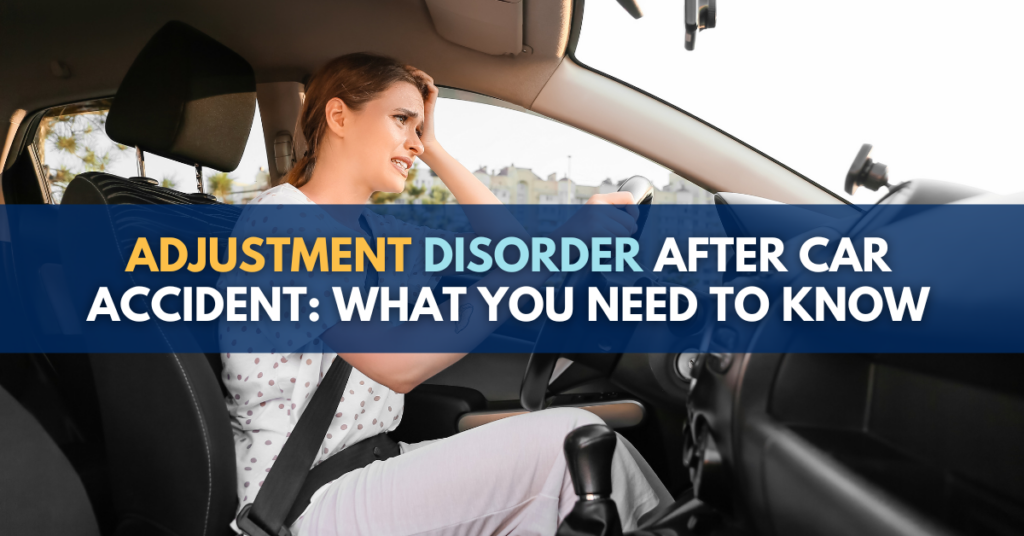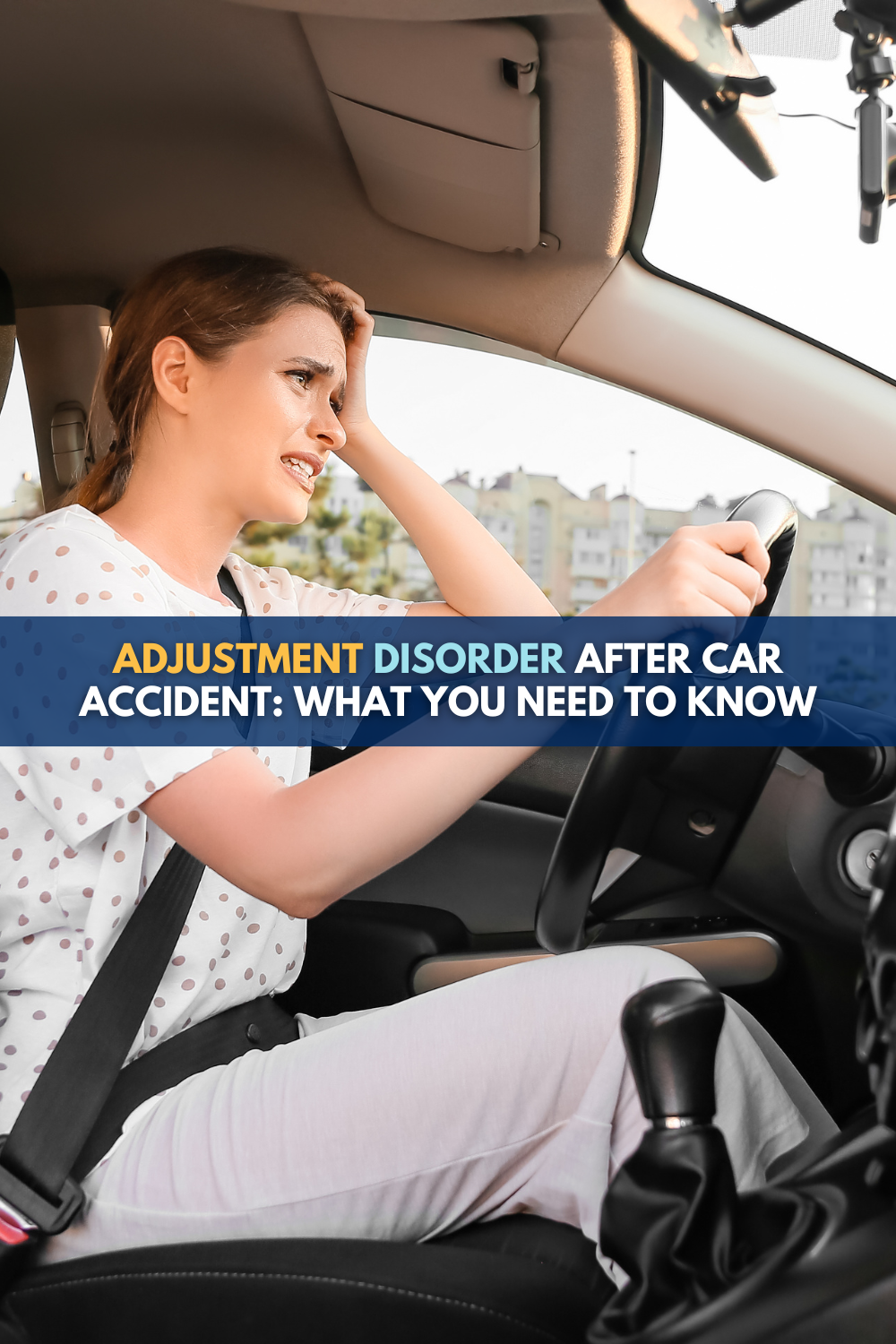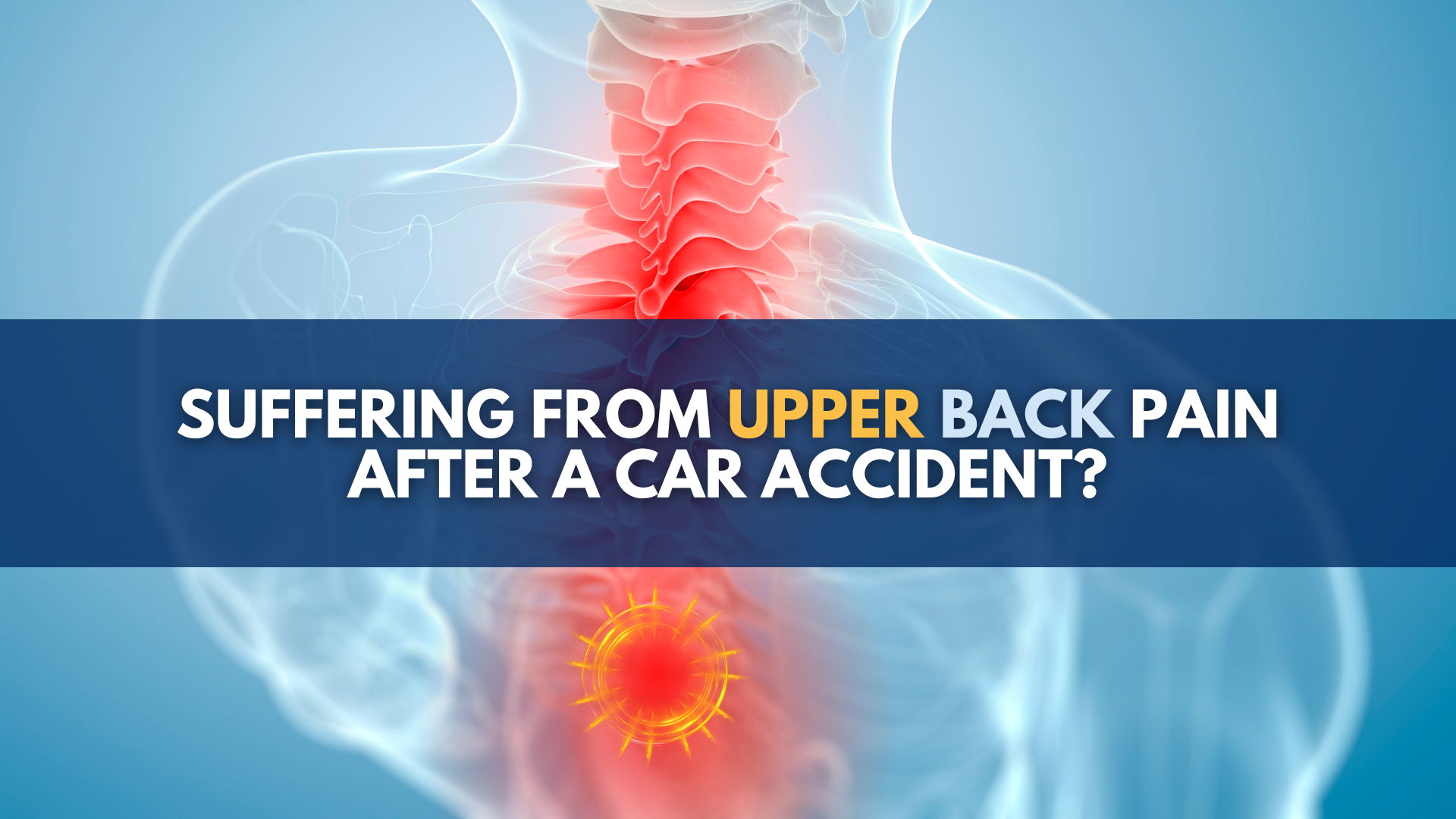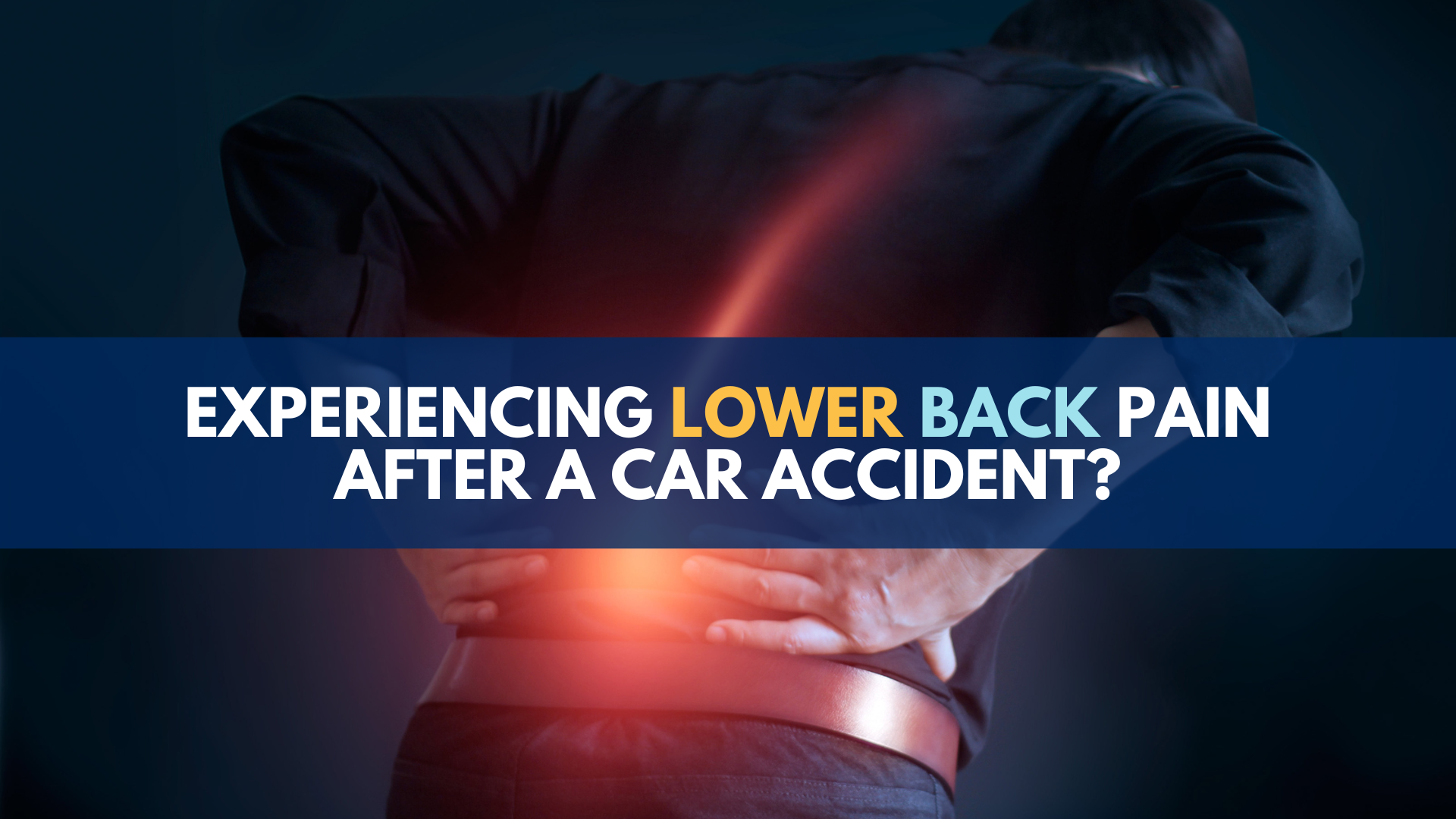
Adjustment disorder (AjD) after a car accident is a mental health condition that occurs when crash victims suffer extreme stress and anxiety as a result of trying to adjust to their post-crash lives. It affects sufferers’ emotions and behavior, making it difficult to work, go to school and maintain relationships.
What is AjD?
Adjustment disorder after a car accident is one type of stress-related mental illness. It is brought on by the stress that a person feels when trying to adjust to the changes and pain that a crash and related injuries have caused.
Symptoms
Adjustment disorder symptoms after a car accident can be emotional and/or behavioral in nature.
Emotional symptoms may include:
- Fear of driving
- Fear of cars and trucks
- Sadness
- Hopelessness
- Lack of enjoyment
- Crying spells
- Nervousness
- Thoughts of suicide
- Anxiety
- Worry
- Desperation
- Trouble sleeping
- Difficulty concentrating
- Feeling overwhelmed
Behavioral symptoms may include:
- Inability to work
- Inability to attend school/do schoolwork
- Poor school or work performance
- Skipping school
- Fighting
- Reckless driving
- Ignoring bills
- Avoiding family or friends
- Vandalism
Acute vs Chronic
There are two classifications of adjustment disorder after a car accident; acute and chronic When symptoms last six months or less, a victim is considered to have suffered an “acute” AjD. However, it is considered a “chronic” AjD when symptoms last longer than six months.
There are also six main types of AjD:
- AjD with depressed mood: Symptoms include feeling sad, tearful and hopeless, and a lack of pleasure in the things you used to enjoy.
- AjD with anxiety: Symptoms include nervousness, worry, difficulty concentrating or remembering things and feeling overwhelmed. Children who have AjD with anxiety may strongly fear being separated from their parents and loved ones.
- AjD with mixed anxiety and depressed mood: Symptoms include a mix of depression and anxiety.
- AjD with disturbance of conduct: Symptoms mainly involve behavioral problems, such as fighting, reckless driving or ignoring your bills. Youngsters may skip school or vandalize property.
- AjD with mixed disturbance of emotions and conduct: Symptoms include a mix of depression and anxiety as well as behavioral problems.
- AjD unspecified: Symptoms don’t fit the other types of AjDs but often include physical problems, problems with family or friends, or work or school problems.
Diagnosis
When you see your doctor, he or she will conduct a physical examination as well as ask about your symptoms, medical history, social history and mental health history.
Your doctor will likely be considering whether your symptoms match up with diagnostic criteria for AjD in the Diagnostic and Statistical Manual of Mental Disorders, Fifth Edition (DSM-5), which is published by the American Psychiatric Association. Those criteria include:
- Development of emotional or behavioral symptoms in response to a vehicle crash that occur within three months of the automobile crash
- Distress that is greater in severity and presentation than one would expect for a automobile crash survivor
- Significant impairment in a person’s ability to engage socially and occupationally and in other aspects of the person’s life
- The symptoms exceed normal bereavement
Treatment
Treatment may include psychotherapy and/or medication.
What to do for adjustment disorder after a car accident?
If you have adjustment disorder after a car accident, follow these steps:
- Get treatment as soon as possible. When it comes to treating an adjustment disorder after a car accident, or any type of depression or mental health condition for that matter, the sooner a person begins treatment, the better the chances are that they will make a full functional recovery and prevent further disruption to their lives. Of course, that’s not always the case and treatment does not guarantee that an AjD will go away, or even get appreciably better – but it is far better to grapple with mental illness than it is to attempt to ignore it. As a personal injury lawyer, I always advise people that the sooner they can get the necessary and appropriate medical care, the sooner they can get back on the road to good health and hopefully to a good recovery.
- Get a referral to a psychiatrist, psychologist, psychotherapist, or mental health professional to diagnose if you have suffered from AjD or related mental health illness. A doctor can’t treat you properly until he or she knows what is causing your stress and anxiety.
- Early documentation of an adjustment disorder after a car accident will make it easier for you to avoid future potential problems with your own insurance company or health care provider. Early medical documentation will establish a temporal connection to prove to a health insurance company or a No-Fault insurance company that your motor vehicle crash was the most likely cause of your AjD. Documenting your symptoms early on can also help you to avoid many of the problems that arise when an insurance company later might try to deny a causal relationship and refuse to pay for medical treatment. Putting it another way, if there is a large gap of time that passes before your AjD is documented, then it is easier for your insurance company to question whether the motor vehicle crash you were involved in was the cause of your condition. Early treatment helps you get better faster, and early medical documentation creates the clear temporal causal relationship that insurance companies will be looking for when they are being asked to pay for necessary medical care.
- Showing a clear temporal relationship between the motor vehicle crash and documentation of when your AjD was reported, diagnosed and treated also makes it easier for your lawyer to obtain a full and fair legal settlement for your injury or mental condition. Delays in treatment and long gaps in medical documentation will hurt your ability to get better faster and to make a good recovery for your injury. Often, it also makes it harder for your attorney to get a reluctant and cynical insurance company adjuster to pay for your treatment and to pay for a full and fair legal settlement after your crash for your pain and suffering if weeks or months have passed before there is any documentation in the medical records.
- Don’t try to “tough it out”: An adjustment disorder after a car accident can be a very serious, life-altering condition. As an injury lawyer, I’ve seen so many instances where people felt like they didn’t want to “complain,” but then an AjD becomes progressively more impairing to the point of causing disability. Note: This is often not the automobile crash victim’s fault. Unfortunately, with our healthcare system today, far too many doctors tend to ignore or disregard mental health complaints.
- Talk to an experienced injury attorney who has helped people with adjustment disorder after car accidents and knows the medicine and what these cases can be worth. A lawyer who focuses on automobile crashes and who has extensive experience litigating motor vehicle crash cases can get you the help you need, including a settlement that reflects the full value of your AjD. An attorney can help you to make sure your bills are getting paid and that your vehicle crash settlement reflects the full measure of the harms and losses you will face.
- Tell your auto insurance company about your adjustment disorder after a car accident. If you live in Michigan, make sure to include this (and any other injuries you suffered and/or symptoms you are experiencing) in your application for No-Fault benefits, which is also referred to as your “written notice of injury” – which must be given to your No-Fault auto insurance company “within 1 year after the accident.” (MCL 500.3145(1) and (4))
- Do not sign any settlements, releases, or waivers related to your automobile crash: Until you have talked with an experienced attorney who is looking out for your interests, do not sign any settlements, releases, or waivers that are presented to you by your auto insurance company, the at-fault driver’s auto insurer or any other insurance companies or persons.
How to make a legal claim for adjustment disorder after a car accident?
In Michigan, you start your claim for adjustment disorder after a car accident by filing an application for No-Fault benefits with the responsible auto insurance company, according to the No-Fault law’s “priority” rules. The No-Fault insurer will pay for your medical bills and your lost wages if you cannot return to work.
Can I file a lawsuit for this injury/condition?
Yes. You can file a lawsuit against the at-fault driver to sue for pain and suffering compensation as a result of your collision-related injuries, but you will first have to show that the other driver was at-fault for causing the motor vehicle crash and that your injury constitutes a “serious impairment of body function” under Michigan’s auto law.
Additionally, you may be able to sue the at-fault driver for other economic damages, such as excess and future medical bills and lost wages.
Finally, if your own No-Fault auto insurance company refuses to pay for – or even tries to cut-off – your auto No-Fault insurance benefits related to your medical treatment and care or wage loss for adjustment disorder after a car accident, then you can also file a lawsuit to sue for unpaid, overdue medical bills, attendant care, medical mileage, replacement services and lost wages because your injury has prevented you from returning to work.
Adjustment disorder compensation after car accident
Your adjustment disorder compensation after a car accident will take several forms. If you have suffered a “serious impairment of body function,” then you can sue the at-fault driver for pain and suffering compensation. Additionally, you may be able to sue for “excess” lost wages and medical bills.
The at-fault driver who caused your automobile crash can be held liable to pay for your lost wages over and above the monthly maximum and/or beyond the three-year limit on No-Fault wage loss benefits. Additionally, the at-fault driver can be sued and forced to pay for your medical bills that exceed and, thus, are not covered by No-Fault PIP medical benefits coverage level in your auto insurance policy.
Need help finding the right lawyer? Call Michigan Auto Law first
If you have suffered an adjustment disorder after a car accident and would like to speak to an experienced injury attorney, call toll free anytime 24/7 at (800) 968-1001 for a free consultation with one of our attorneys. You can also get help from an experienced accident attorney by visiting our contact page or you can use the chat feature on our website.



